Oregon Tradeswomen’s First Laborer-Focused Rural Pre-Apprenticeship Class!
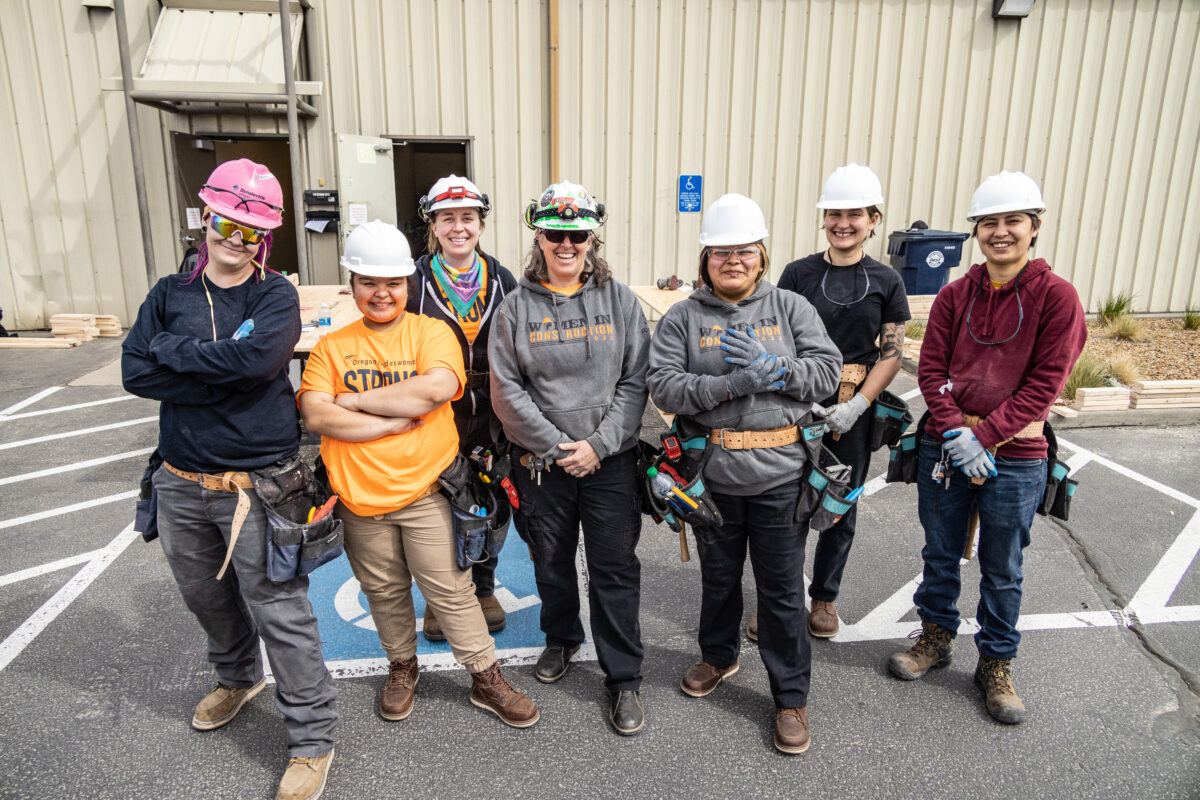
Oregon Tradeswomen is a Portland-based non-profit organization, but it has been our goal to expand our pre-apprenticeship training and services across the state of Oregon. This year, we got closer to that goal! We worked with the Oregon Laborers Training and Apprenticeship, with funding through our contract with the State Apprenticeship Expansion Grant, to pilot a rural training program to recruit more women and non-binary folks into the Construction Craft Laborer trade!
Like Oregon Tradeswomen’s primary 8-week Trades and Apprenticeship Career Class (TACC), the Laborer’s Rural TACC is a 192 hour BOLI-Certified pre-apprenticeship, but was condensed into 5-weeks with a focus on the Laborer trade. Pre-apprentices spent the first few weeks building a foundation of skills through tool assessments, fitness conditioning, and construction math. Then, in Week Three, the Oregon Laborers led a Laborer’s boot camp where class participants applied their new construction skills on hands-on projects such as framing then deconstructing an 8′ x 8′ wall.
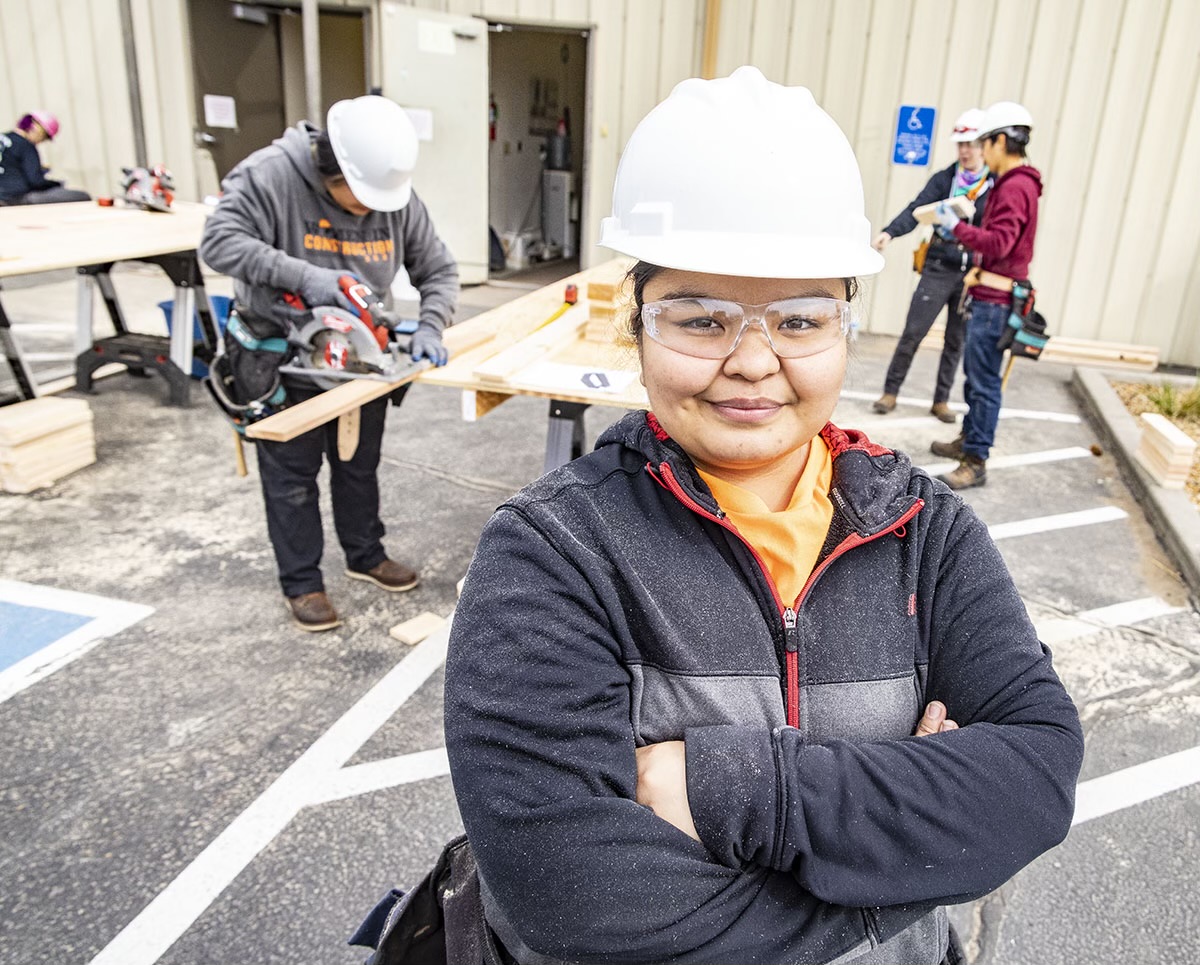
Hands-on training continued through the end of the program with students working on projects like building benches for the Warm Springs Reservation assisted living facility: the High Lookee Lodge! With several participants belonging to the Warm Springs community, there was a profound sense of pride in using their new skills to give back. In fact, one participant shared that her goal in pursuing a career in the trades was not only to provide for her children and two teenage siblings, but to bring her expertise back to Warm Springs and make much needed improvements to the infrastructure there.
By the end of the 5-week program, all participants graduated, not only as BOLI-certified pre-apprentices, but with OSHA 10, CPR, First Aid, and Forklift Certifications. A certification in Green Construction is also available to interested graduates through a two-day training with our partners at Earth Advantage. The most unique element of this training is that program graduates are offered direct entry to the Oregon Laborer’s Apprenticeship program as well as immediate employment to bridge the gap between graduation and starting Apprenticeship.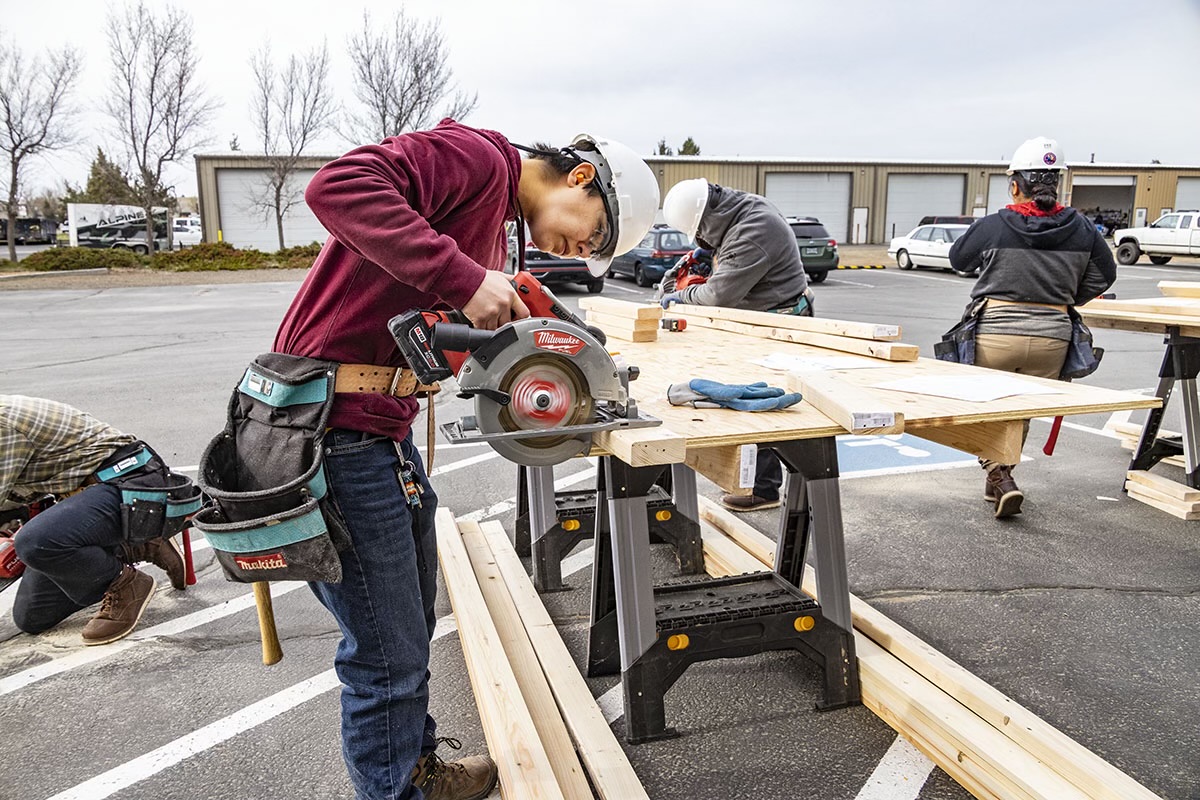
When reflecting on the past 5 weeks, Oregon Tradeswomen Training Coordinators Carol Murray and Kate Hibbs expressed their pride in the achievements of each graduate. “Seeing pre-apprentices find out that they are good at something on the first try is just so rewarding,” Kate shared. “Those little successes build on each other and create confidence for everything that follows.” Carol was particularly inspired by the level of camaraderie fostered among the students. “They’re helping one another, they’ve got each other’s backs, they’re checking in if someone is late,” she explains. “The way they connect with one another before they go out into the field is vital.”
We weren’t the only ones impressed with the Redmond pre-apprentices! This cohort had a few very special visitors join them throughout the 5 weeks. First, Oregon Governor hopeful, Tina Kotek, stopped by to learn more about the importance of pre-apprenticeship and how programs like TACC break down barriers for women to enter and be successful in the skilled construction trades. Then, we had Robert Camarillo, Wayne Chow, and John Mohlis of the Oregon State Building & Construction Trades Council stop by to say hello to our training team and see the trainees in action! It is always a treat to have such influential visitors come to see the great work being done by our pre-apprentices.
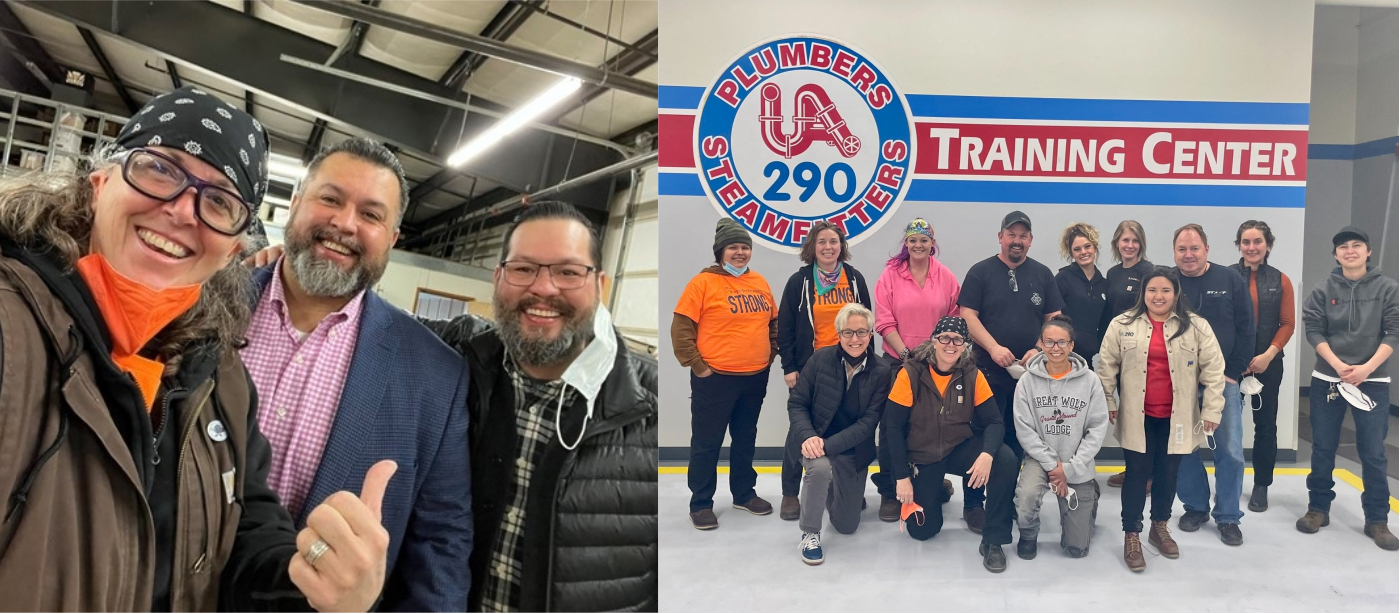
Not only are our pre-apprentices developing valuable job skills for a bright future, but Redmond graduate Sage Flowers was given an incredible opportunity to tell her story at the Democratic Party of Oregon Summit. At the Summit, Sage joined a panel about growing Oregon’s economy through infrastructure investment, partnerships, and registered apprenticeships where she spoke from personal experience about how policy efforts to expand training and apprenticeship opportunities directly impact the lives of women in her community. Rural communities often lack access to career exploration and training programs that lead to family-supporting wages. Through this partnership between Oregon Tradeswomen and the Oregon Laborer’s Training and Apprenticeship, we are working to bring more career education and trainings to the communities that need them. With proper funding and policy, training opportunities for rural communities can expand further across the state.
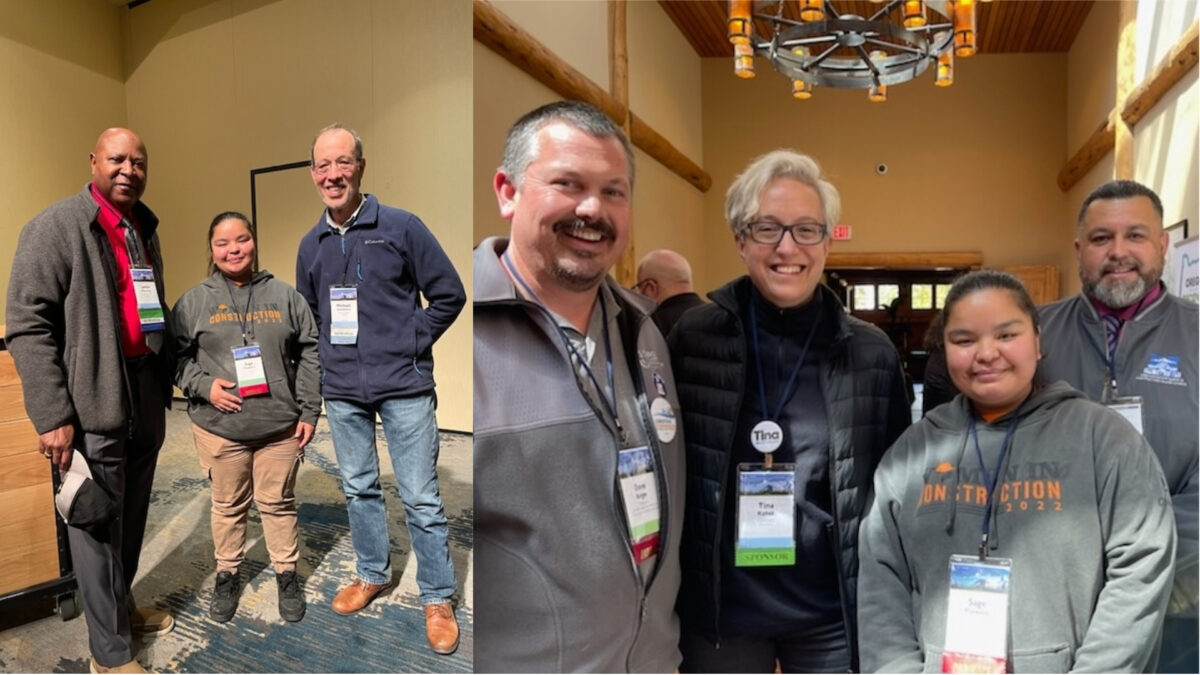
Now that our Redmond pre-apprentices have graduated, we know they have bright futures in the trades. These 6 hard workers gave their all to commit their time and energy to complete our 192-hour program in just 5 weeks! We have so much gratitude for UA Local 290 for hosting us in their training facility, the Oregon Laborer’s Training and Apprenticeship for partnering to deliver this training, as well as COIC Worksource and East Cascade Works for providing supportive services (and a fantastic video about our training!). Additionally, we thank the Warm Springs Tribal Employment Rights Office for recruiting community members for this training. Special thanks to our friends Dave Burger, UA Local 290, and Taunia Blakely, IBEW Local 280, who were key in this project coming together.
It really does take a village to change lives and we are so proud of this community for stepping up to the plate to help make this rural training a success. We cannot wait to get back to Central Oregon and help more women get on the path to a fulfilling career in the trades!
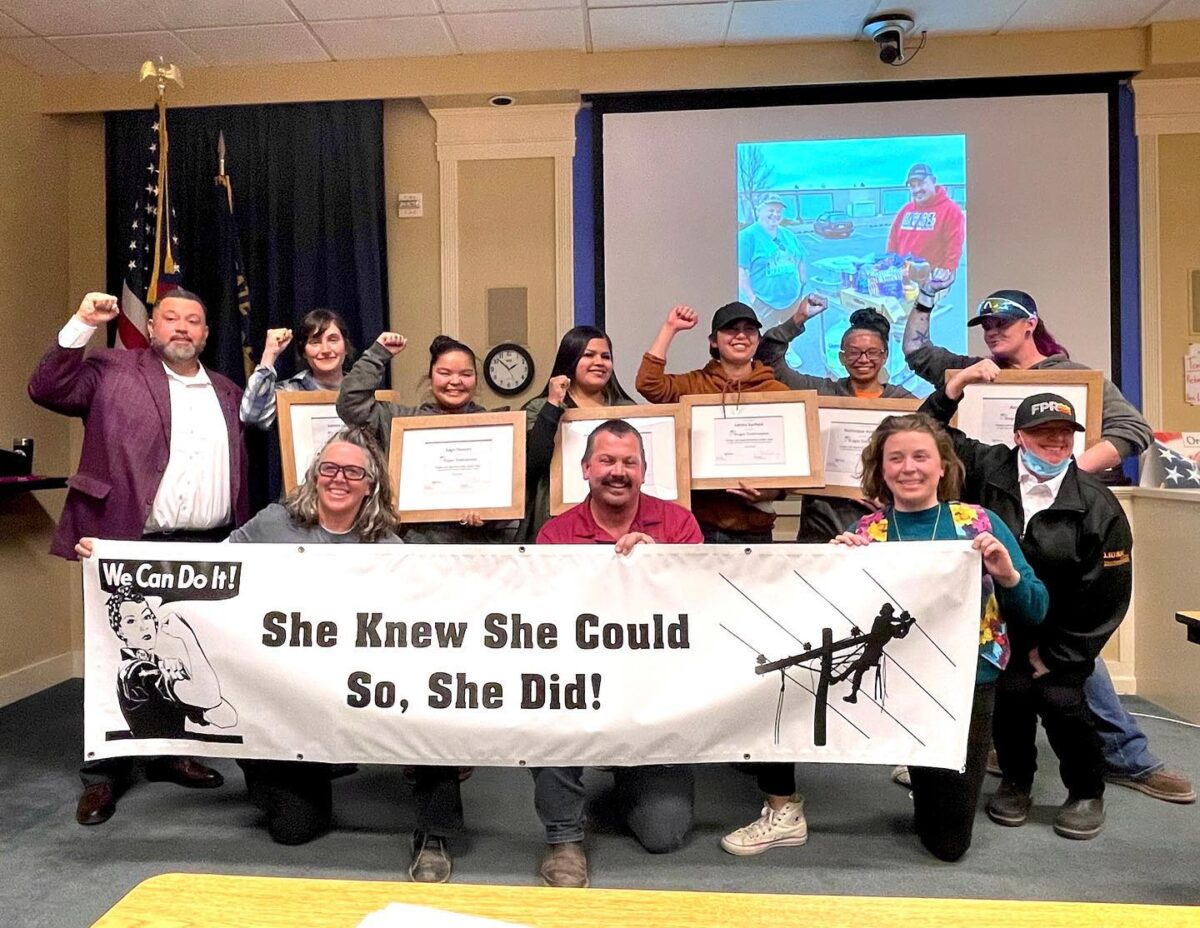
Mothers Day 2022: Pregnancy in the Trades
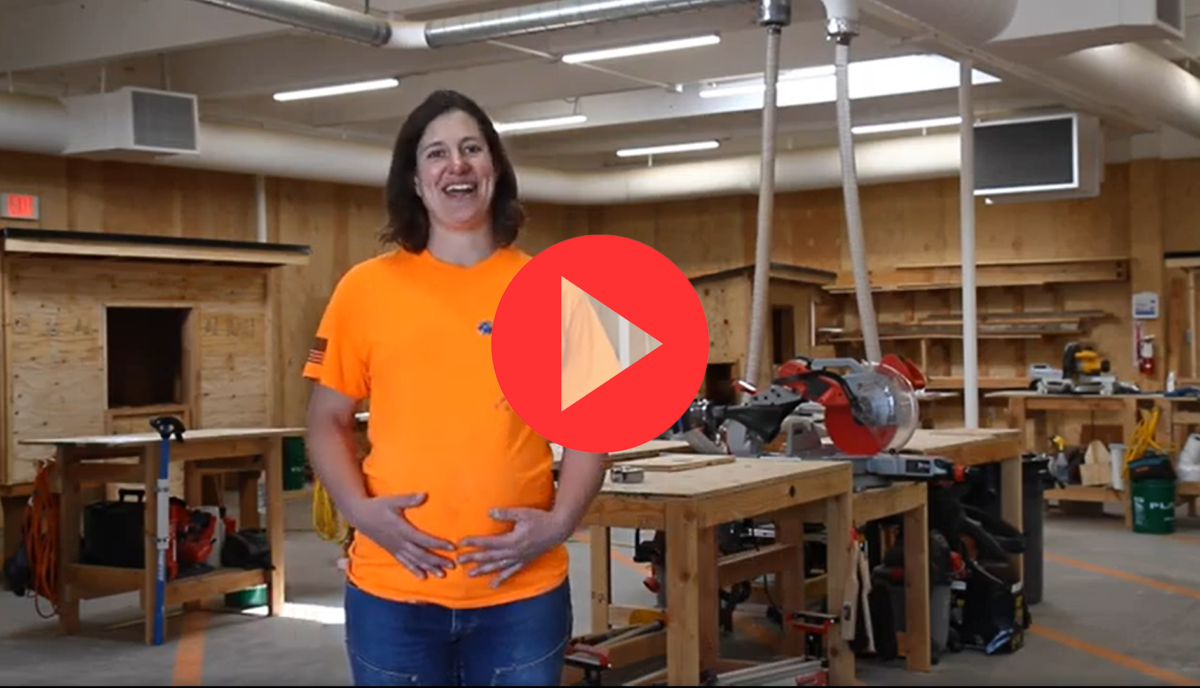
Liz Nichols shares her tradesworker pregnancy story with Oregon Tradeswomen. Check out Liz’s full story on Youtube!
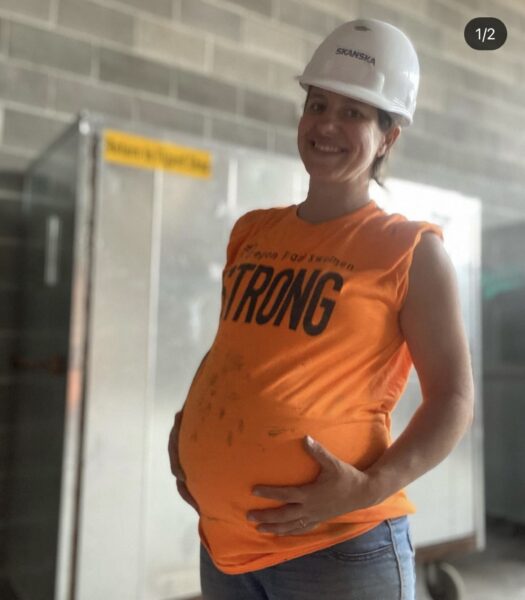
Did you know that women can, and do, work in the trades while pregnant? When we caught up with Liz Nichols after her appearance on CBS’s Tough as Nails skilled-trades competition, the Oregon Tradeswomen graduate and new Business Agent with Cement Masons Local 555 generously shared her experience about being pregnant on the jobsite!
Liz welcomed her second child into the world last September, but when Liz was pregnant with her first child as an apprentice, the lack of resources to guide her through the journey was intimidating. The first doctor she met gave her the unsettling news that she shouldn’t plan on working after the first half of her pregnancy. When Liz connected with a nurse midwife for a second opinion, she was assured she could continue working longer into her pregnancy. Having been acclimated to the physical labor of being a cement mason, Liz learned it was safe to stay at her current activity level, but to be sure to listen to her body. So, Liz did just that and showed up to do cement-work on the jobsite every day up until three weeks before her due date!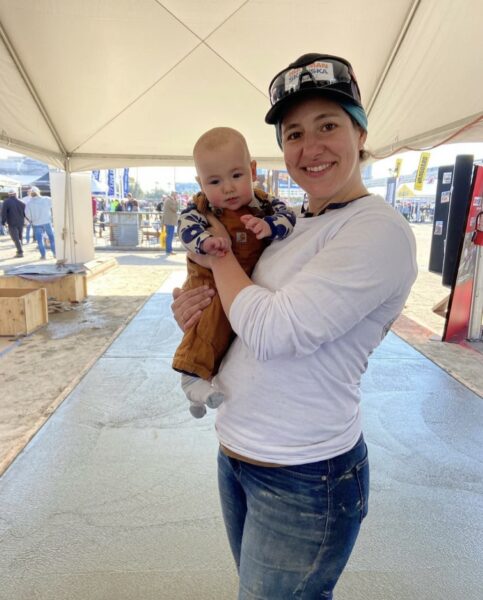
Months after she was back at work, Liz was on a job with another tradeswoman who was going through her first pregnancy. Having just forged her own path as a pregnant tradesworker, Liz was able to share the valuable tips and tricks she learned from being pregnant with her first-born. Being able to share her experiences was really rewarding, and being the guide she didn’t have during her first pregnancy was a significant for Liz. She told us she is excited for the day these these narratives become normalized.
This Mothers Day, we are delighted to be able to share this story because of how little representation there is for pregnant tradesworkers. Being a woman in construction is already a unique experience, so there are even fewer stories out there about pregnancy in the trades. Even so, something special we see constantly from tradeswomen is an enthusiasm to support and mentor fellow tradeswomen.
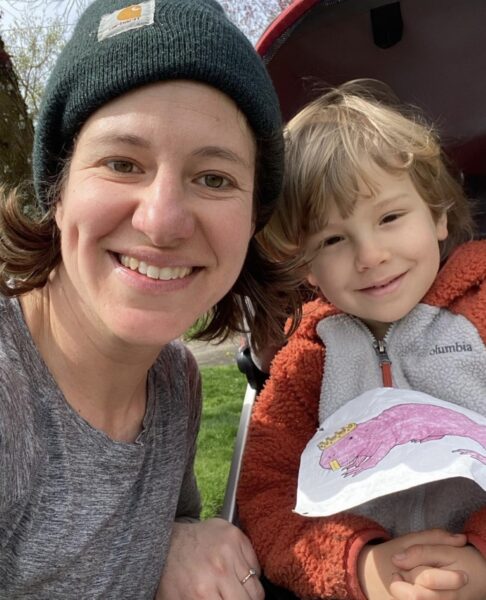
Fortunately, more unions and employers are stepping up to offer parental benefits to their workers. As more women than ever are starting careers in the trades, we anticipate increased visibility and acceptance for tradeswomen who choose to work while expecting a new addition to the family.
As for Liz? She continues to be a support system for many tradeswomen who reach out to her for advice on social media, doing her part to be the change for tradeswomen across the country! And somehow, Liz also manages to find time to explore cement work in a creative way on a small scale. Through her side-hustle, Gray Day Goods, she is a regular donor to Oregon Tradeswomen’s Build With Us! Auction. You can check out Liz’s Cement artwork on Etsy: https://www.etsy.com/shop/GrayDayGoods
Future Ready Oregon: A Win for Workforce Equity
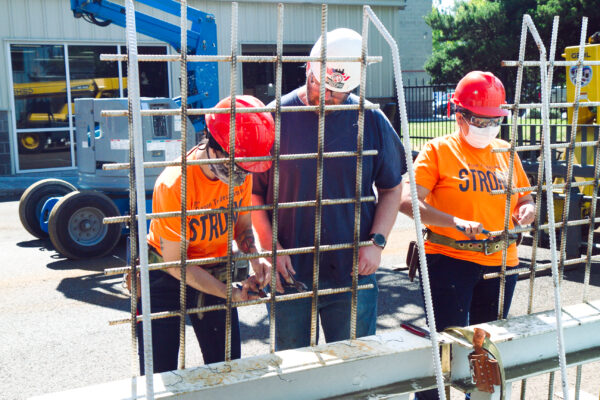
In a tremendous win for workforce training equity, Governor Kate Brown signed the Future Ready Oregon bill into law. Future Ready Oregon is a blueprint for change and an opportunity to build an economy in Oregon that supports all workers in achieving their dreams and building a more prosperous future.
Funding from this bill will create new workforce development programs and expand existing programs in healthcare, technology, manufacturing, and other high-demand sectors while reducing barriers to employment. This investment package will specifically support community college Career Pathways programs, local Workforce Boards, and apprenticeship programs as they expand their capacity to provide free career education and support services to more Oregonians. Funding will also strengthen pre-apprenticeship like Oregon Tradeswomen’s Pathways to Success program that demonstrates strong outcomes for women in construction. Oregon Tradeswomen program graduates start their careers making an average wage of $22.81 per hour.
In addition to supporting and expanding current workforce development programs, Future Ready Oregon encourages innovation by providing Workforce Ready Grants to fund education and training programs in industries lacking accessible career pathways. With these programs, there is a renewed commitment to continuous improvement and accountability by tracking data to measure success outcomes for underserved populations.
Oregon’s Racial Justice Council and the Governor’s Workforce Workgroup helped guide this policy through a lens focused on equity to ensure minority groups like women and people of color are not left out of economic recovery. Oregon Tradeswomen’s Executive Director, Kelly Kupcak, served on the Governor’s Workforce Workgroup and contributed to the proposal which includes the goal of serving at least 50% women through these new and existing programs.
Future Ready Oregon makes much-needed new investments in the programs that help workers overcome barriers to pursuing careers providing economic security through good wages, health insurance, and retirement benefits. These investments will provide resources to offset the costs of support services such as childcare, transportation, and housing stabilization. When quality training is coupled with direct support, workers are successful in securing employment, businesses can meet their labor demands with a qualified workforce, and our communities have a shared prosperity model that works for everyone.
Tradeswomen Advocate Leslie Cotton Pushes for Equity
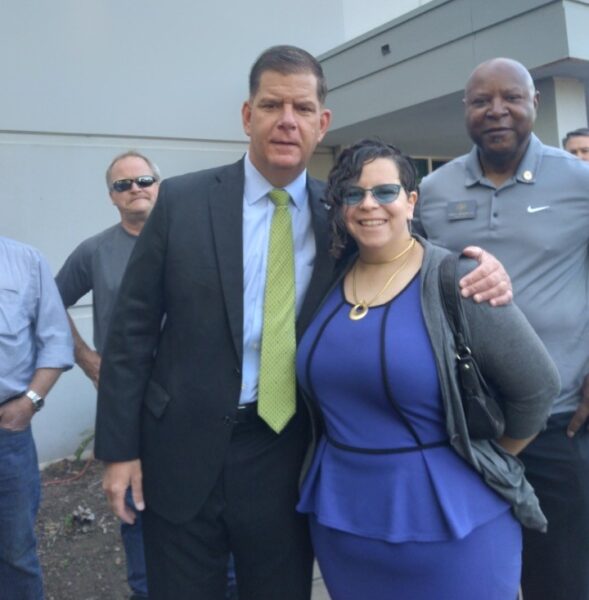
The first step to affecting change is by raising awareness: nothing can change if people don’t know about the issues! The tradeswomen movement has been around for decades, but with historically low numbers of women in the trades, it has been an uphill battle to gain visibility of this mission with our leaders, but times are changing.
The tradeswomen movement is more than just changing the idea that women can work in construction. It’s about ensuring jobsites are welcoming to women, creating debt-free pathways to employment, and reducing barriers to accessing these careers such as affordable childcare or reliable transportation. While Oregon Tradeswomen has been helping women find success in the trades since 1989, we need the awareness and support of our leaders to set up better systems to continue training and retaining diverse, skilled workers in the face of a huge labor shortage.
The Biden Administration passed the new Bipartisan Infrastructure Bill giving long-overdue funding to repair, rebuild, and improve upon the United States’ aging infrastructure. In addition to the roads and bridges associated with infrastructure, these funds will invest in the workers needed to achieve these goals. This means expanding apprenticeship and pre-apprenticeship training, addressing workplace harassment and discrimination, and ensuring women and people of color are included in this monumental overhaul of our nation’s infrastructure.
From the inception of the bill, our leaders have shown their commitment to listening to the voices of tradesworkers to make this plan equitable and effective. As part of a Memorandum of Understanding (MOU) between the U.S. Department of Labor and the U.S. Department of Transportation, a virtual Town Hall was held on March 7th, 2022 to hear from a panel of workers around equitable job creation, job quality, labor standards, and workforce development. One of these panelists was Leslie Cotton, an Oregon Tradeswomen graduate and Union plumber with UA Local 290. Leslie has been a vocal advocate for women and people of color in the trades and had the opportunity to speak directly with Labor Secretary Marty Walsh on the importance of access to job-training for rural Americans, and safe, healthy workplaces.
Leslie shared her story as the daughter of a single father in rural Washington who struggled, like many others in their small community, to find work that could support his family. Seeing her father work day-and-night to provide for Leslie and her disabled brother drives Leslie’s activism because she knows her family is not alone in this experience. When her father got sick, Leslie was faced with the responsibility to provide for her family and, with the job-training she received at Oregon Tradeswomen, she found the ability to do so in the trades.
Even though Leslie worked hard to build her career, as a woman and a person of color, she faced her share of obstacles. Men on the job would belittle her because they just saw her as a “diversity hire,” and not a fellow trades-worker. She even came to work one day to find a noose on her jobsite, a racist symbol that is now illegal to display in the State of Oregon. These experiences are not uncommon and by speaking up, Leslie is letting our leaders know that more must be done to ensure workplaces free of harassment, hazing, and discrimination.
With the input of trades-workers like Leslie, our movement has more visibility than ever. As a result, we are seeing a new commitment from policy-makers to invest in systems centered in equity. We look forward to following the implementation of the Infrastructure Bill and the impact on our industry. Everyone deserves to work meaningful, family-supporting jobs and we believe we are at the precipice of real change for workers everywhere.
Honoring Black History Every Day

As we celebrate and honor Black History month, I am reminded of the words of my former colleague from my time working at Chicago Women in Trades, a sister organization of Oregon Tradeswomen, who so powerfully speaks to the notion that Black History is only to be celebrated during one month of the year. She reminds me that Black History is made every day. And every day, being Black in America is both a celebration and a burden because racism and bigotry continue to exist, and our society continues to define humanity in the words of Audre Lorde as “white and male, for starters.” While Oregon Tradeswomen centers our work in equity, there is much more we are called to do.
As a white person in a nonprofit leadership role, I am trying to learn and unlearn every day.
Sometimes this work seems so heavy, so incredibly impossible, that it is hard to know what we can possibly do to change things. But, when these moments come, I am reminded that change does indeed happen, and we have to continue to hope and believe that together, we can make a difference. In this work with each of you, which I am incredibly grateful to be part of, I believe we will.
Yet, it is not enough to simply hope for change. It is not nearly enough to only have a Diversity, Equity, and Inclusion plan. It is not nearly enough to have an annual training for staff and board. We need to do more to ‘lean in’ to hard conversations and to question the status quo. While these efforts are part of the work, if we are going to affect real change and make equity more than just a buzzword, we must actively work to change systems of oppression and dismantle centuries of white supremacy. Racism is so deeply engrained in our society that often, well-intentioned white people (including myself) are missing our own implicit biases and failing to move from allyship to becoming accomplices in the fight for justice.
Moving from ally to accomplice means that we as individuals, as well as nonprofits, must not only embrace intersectionality, and examine how race, ethnicity, class, and gender have shaped the experiences of Black, Indigenous, and other people of color in our country – but, we must make an intentional shift to action. Action to move from “not racist” to actively antiracist.
Author and historian, Ibram X. Kendi, defines the transformative concept of antiracism, which he says will “help us more clearly recognize, take responsibility for, and reject prejudices in our public policies, workplaces, and personal beliefs.” Kendi says we can learn how to actively use this awareness to uproot injustice and inequality in the world – and replace it with love while taking action.
Action in our program work, our public policy platform, and our partnerships with community and industry. Action in dedicating fundraising for Oregon Tradeswomen’s Helen Getchell Women of Color Fund, established to help address barriers and increase retention for Black, Indigenous, and other women of color in the trades. Taking action to change the culture of the construction industry and our jobsites in partnership with industry and community through the regional Safe from Hate Alliance. Action in working to uphold the Safe from Hate Jobsite Culture Pledge through partnering with Professional Business Development Group to launch RISE Up Oregon, a culture change program designed specifically for the construction trades. It’s also about making changes and taking action in our internal agency, and in our policies and practices as a nonprofit so that we are not simply talking about equity but working to live it as a value each and every day as we become actively antiracist.
In her 2000 work, the national bestseller “All About Love,” Black feminist, scholar, and activist bell hooks speaks to community and social justice values as “living by a Love Ethic,” in which she says that the antidote to domination is a love ethic. She writes, “Domination cannot exist in any situation where love ethic prevails… All the great social movements for freedom and justice in our society have promoted a love ethic.” hooks reminds us that living such values and realizing a “Love Ethic” requires courage and commitment, further noting that one of the very challenges to a love ethic is “a refusal to stand up for what you believe in.”
This month, and every month, Oregon Tradeswomen is celebrating Black History, and working to stand up for what we believe in. We are working to take action. We are working to live by a love ethic, and in the words of Ibram X. Kendi, we will work to uproot injustice and inequality in the world — and replace it with love while taking action.
I’m in. I hope you are too.
In solidarity & gratitude & love,

Kelly Kupcak
Executive Director
kelly@oregontradeswomen.org
Building Code Boards: CALLING ALL WOMEN
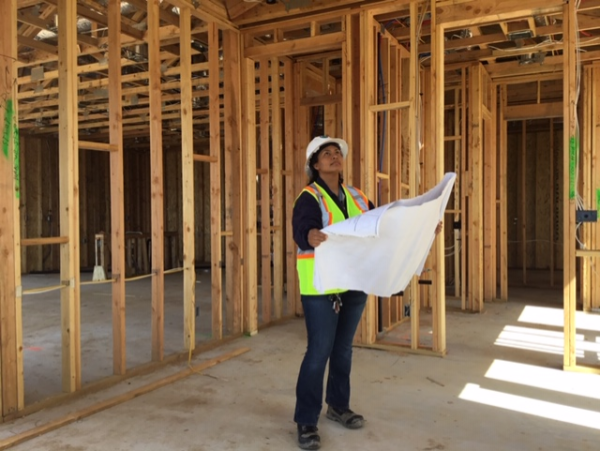
Jennifer Turcios, the city of Santa Clarita first woman inspector. Coutesy of the city of Santa Clarita.
An average person spends approximately 90 percent of their time indoors, yet many of the buildings in which we currently live and work are some of the largest sources of greenhouse gasses, waste energy, and harm our health.
In our time of climate crisis, our homes and buildings become our refuge. State level codes set the standards to make sure our buildings are safe and sustainable places to live, work, and raise our children. By serving on one of these very important boards you can help change an agency and make your voice heard.
Women, and especially women of color, are significantly underrepresented in Oregon’s decision-making processes around building codes. Building energy codes are the primary mechanism in place to regulate energy performance in new construction or major building renovations and they need to hear your voice.
Building Codes?
Building codes are set at the state level in Oregon. They regulate important aspects of fire, life, and safety in new homes and buildings. As a subset of overall building codes, energy codes establish minimum levels of energy performance in these homes and buildings.
Building codes in Oregon are administered by the state Building Codes Division (BCD), alongside legislatively mandated advisory boards. These advisory boards play a vital role in determining the minimum energy efficiency of Oregon’s new homes and buildings. Board members are citizen volunteers representing different construction-related industries.
The boards include the Residential and Manufactured Structures Board (RMSB) focused on low-rise residential dwellings and the Building Codes Structures Board (BCSB) which focuses on commercial buildings. Members are appointed by the governor and subject to confirmation by the Senate. The RMSB consists of 11 members with four-year terms. The BCSB consists of 9 members with four-year terms.
Board Service
Serving on the RMSB and BCSB Advisory Boards is an important role which helps set the direction for how homes and buildings are built in Oregon. In addition to having a voice on key codes decisions, advisory board members interact with construction industry professionals on a range of topics and hear expert testimony on all codes proposals coming before the Advisory Boards. Advisory Board members also interact with State of Oregon Building Codes Division staff.
Historically, the BCD has been reluctant to set codes and standards that will help move Oregon towards creating resilient and climate friendly homes and buildings. With your involvement, that could change.
The Advisory Boards include legislatively mandated representatives from various construction industry specialties:
- “A Representative of residential building trade subcontractor” (RMSB)
- “A Contractor specializing in residential structures” (RMSB)
- “A Contractor specializing in remodeling residential structures” (RMSB)
- “A Public Member” (RMSB)
- “A Representative of the building trade” (BCSB)
The state does not provide any specific experience requirements to serve on Building Codes Boards, but applicants should be able to show they have related work experience for the seat they are applying.
Information and Resources
Residential and Manufactured Structures Board (RMSB)
Building Codes Structures Board
General “Become A Board Member” Information
For more information
Please feel free to reach out with specific questions:
Amy Cortese: amy@newbuildings.org
Anthony Roy: aroy@earthadvantage.org
To apply, please visit:
https://www.oregon.gov/gov/admin/SiteAssets/Pages/How_To_Apply/Interest%20Form.pdf
Oregon Tradeswomen’s Summer Night and Weekend Training
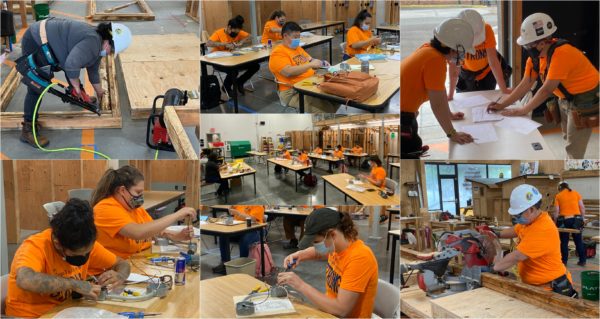
Oregon Tradeswomen recognizes the need to provide options to working women to participate in our programs. Many of our Trades and Apprenticeship Career Class (TACC) pre-apprentices are not only juggling family demands, but working while attending the program. In fact, many join while employed full time and have to give up employment in order to attend. To help these students achieve their career goals while financially sustaining their families, Oregon Tradeswomen responded by offering a night and weekend TACC class this Summer.
Here are some of the participants’ accomplishments observed so far, thanks to the alternative night and weekend schedule:
- Two TACC participants work full-time jobs during the day and are committed to graduate while preparing for IBEW’s Electrical Apprenticeship.
- A third student is working full-time as a teacher aid while caring for a newborn and a toddler while attending TACC.
- Another participant is able to work part-time, care for her kids, and thanks to the current schedule, her husband can watch the kids in the evenings.
- We also have a participant who is a full-time mom, and is able to leave her kids with their dad in the evenings so that she can attend classes.
Oregon Tradeswomen is able to be responsive to jobseeker needs, and shift our programming with the valuable collaboration of industry partners and we will continue to make our program more accessible. Look for additional evening and weekend classes in 2022!
Graduate Success Story: Jamie Jarrett
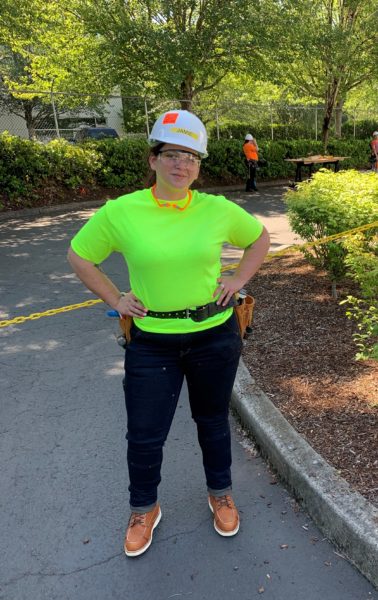
In 2019, Jamie Jarrett came to Oregon Tradeswomen with a tenacious drive to change her life. Having grown up in a cycle of poverty without a strong support system, Jamie found herself battling drug addiction and had to do whatever she could to make ends meet to survive. From working in a strip club, to managing a fast-food kitchen, the opportunities available to her did not provide the long-term stability she needed to live a happy, healthy life.
Despite the barriers she faced, Jamie’s determination to overcome adversity was a key asset as she evaluated what she needed to do to secure a bright future for herself. She originally found out about Oregon Tradeswomen (OTW) from her fiancé, a union carpenter who had worked with an OTW graduate in the field. It wasn’t until a miserable day at work that Jamie seriously considered pursuing a career in construction. With fire in her belly, Jamie did everything she could to get involved with Oregon Tradeswomen, attending events, social hours, and information sessions until she was selected for the Fall Trades and Apprenticeship Career Class of 2019.
Joining this training cohort offered Jamie a positive community of women that fostered friendliness and support. Jamie told us, “I have never experienced an environment like this before where women were helping each other instead of fighting to get ahead.” This support system did not end with the 8-week program. Being the only woman on a job-site can sometimes be isolating, but having a network of women who are going through similar experiences is a truly invaluable resource.
When Jamie finished her 8 weeks of pre-apprenticeship training, she set her sights on the electrical trade because of her enjoyment of science and math. Jamie also got involved with various Facebook groups for electrical apprentices and female electricians to get a better idea of what the work would be like. When she saw photos of huge substations and carefully bent conduit, her excitement for the trade intensified. “If I was to go and learn something new, I knew I wanted to bend pipe and make an electrical room look like what I saw online. There is something aesthetically pleasing about electrical work,” Jamie explained.
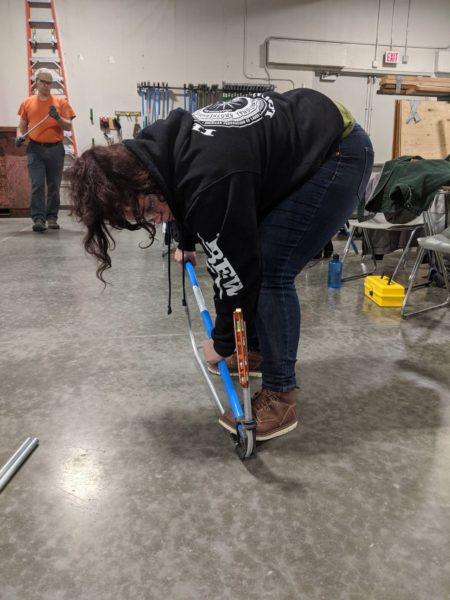
Jamie is now a 4th term electrical apprentice at the NECA-IBEW Electrical Training Center where she now goes to work every day looking forward to learning new things and putting them in practice. Not only does she love her job, but she has broken through the cycle of poverty. Jamie shared with us that, “In the trades, I know I can be on my own and be okay. I know I have food to eat every day, I have an apartment to go home to every night, and I have health insurance for the first time in my entire life.” The newfound security and comfort in her life, both financially and mentally, also allows her to take time off to visit places she has always wanted to see. She also stresses that “I never thought five years ago that I would be here and working towards a career that is good for my whole life, that nobody can take away from me. No matter what I go through in my life, I will always have this.”
When we asked Jamie about what motivates her to keep going on the hard days, she said that the progress she has made since she took her first steps at Oregon Tradeswomen just about two years ago is what inspires her. In those two years, her life took a total 180 degrees all on her own merit. “I have achieved so much,” Jamie says. “So far I have completed three terms of schooling and have gotten straight A’s. The fact that I want to go to school and learn feels so good!” Jamie proved to herself that she can accomplish anything she sets her mind to and that is a power in of itself.
Jamie’s optimism about the future is undeniable. Her goal is to give back to the next generation of tradeswomen by becoming an instructor at the NECA-IBEW Electrical Training Center, but for the time being she is truly enjoying her day-to-day as an electrician. Her love of the work and the stability it affords prompts Jamie to help other women navigate to a career in the trades. She is open about her own journey and how getting involved with Oregon Tradeswomen changed her life. When asked why someone should support Oregon Tradeswomen, she says, “They give chances to people that might not ever have had any. If Oregon Tradeswomen didn’t take a chance on me, I wouldn’t be where I am today.”

Its stories like Jamie’s that keeps our mission moving forwards. When we hear Jamie say, “my biggest achievement is learning who I am supposed to be,” and that “being in the construction world has been that piece that I was missing,” we know we are making a concrete impact on people’s lives. Everyone deserves to have a career that they love, and everyone deserves to have a prevailing wage with generous benefits.
Oregon Tradeswomen is proud to be a part of Jamie’s success story, but it was her perseverance that got her to where she is today.
Workforce Partner Spotlight: Autodesk
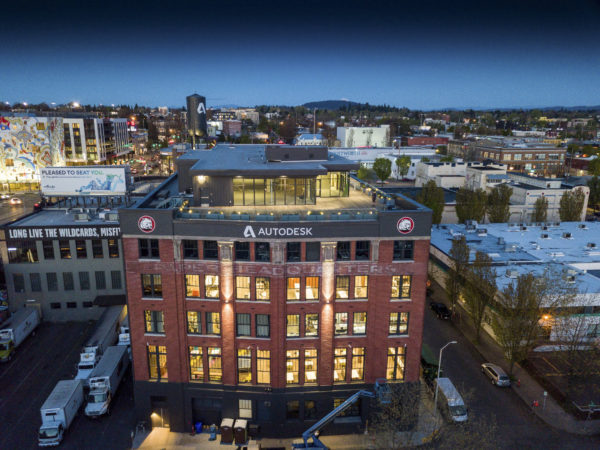
Aerial view of the Autodesk offices in Portland, Oregon.
Oregon Tradeswomen is always grateful to our Workforce Partners for their commitment to a diverse and equitable workforce. When we moved in to our new office space in the Rockwood neighborhood, complete with a workshop for our pre-apprenticeship training program, Autodesk helped us out with a donation including AutoCAD 360 software to help us take our hands-on training to the next level. Autodesk is changing how the world is designed and made. Their technology spans architecture, engineering, construction, product design, manufacturing, media, and entertainment, empowering innovators everywhere to solve challenges big and small. From greener buildings to smarter products to mesmerizing blockbusters, Autodesk software helps their customers to design and make a better world for all.
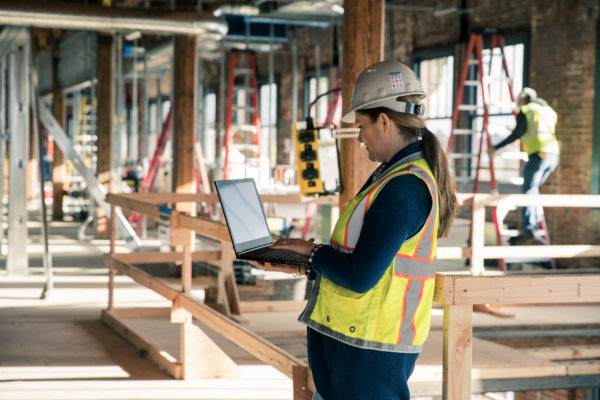
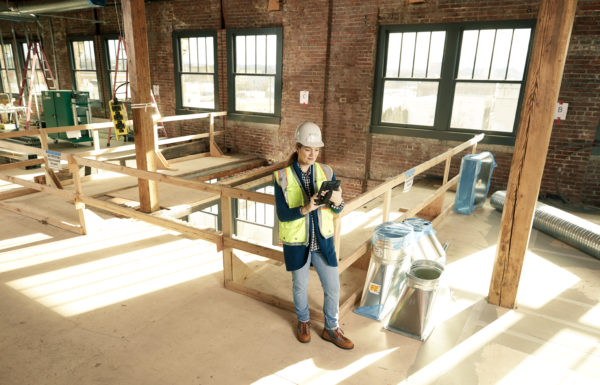
2021 Summer Tool and Gear Swap
For the first time since we moved in to our new office in the Rockwood neighborhood, we opened our doors to the community this August for our Summer Tool and Gear Swap!
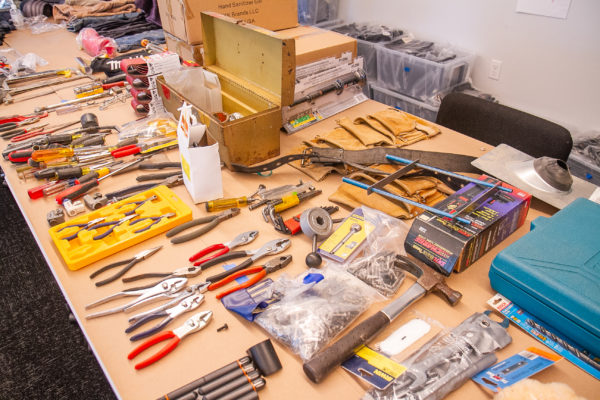
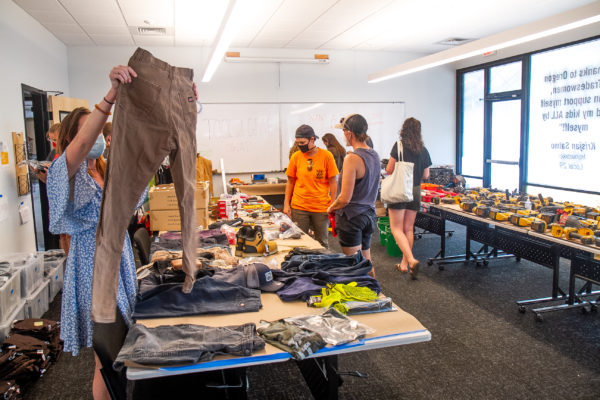
Oregon Tradeswomen continues the tradition of these Tool and Gear Swaps becausebuilding up an arsenal of tools at the beginning of a career in the construction trades can cost hundreds of dollars. This event offers a way for tradeswomen to gather tools they need for free, and it brings our tradesworker community and our new Rockwood community together!
We were thrilled to see such an enthusiastic turnout of graduates and friends of the organization as well as some new friendly faces! It was heartening to witness connections being made and information shared over the selection of tools. One Oregon Tradeswomen graduate even came to the event to help re-build another graduate’s tool library after their equipment was stolen from their car. Whenever our network of tradesworkers come together, it is clear that the bonds that are made under our roof are long-lasting!
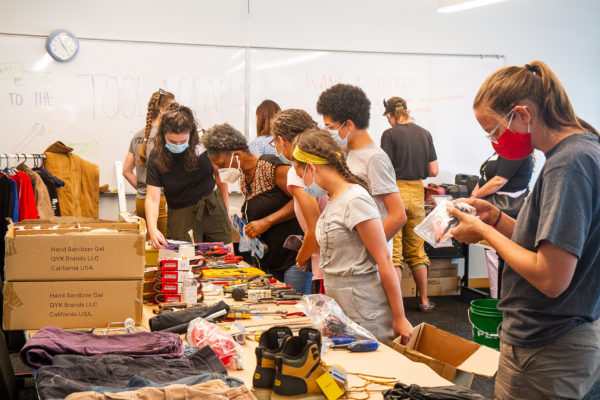
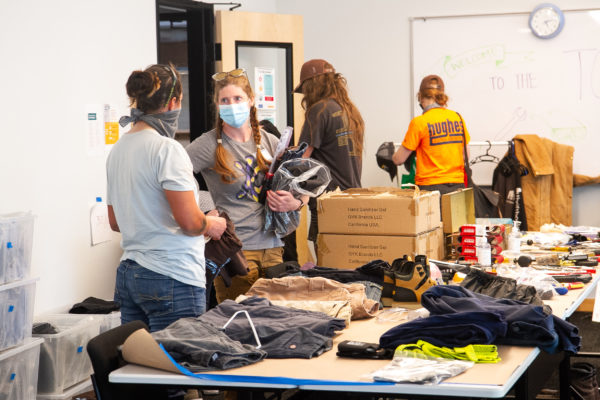
We cannot forget to thank our wonderful business partners Neil Kelly, Knife River, and Milwaukee Tool who provided eager volunteers to help us run the event! We are so grateful for our partners’ willingness to pitch in and make this event run smoothly!
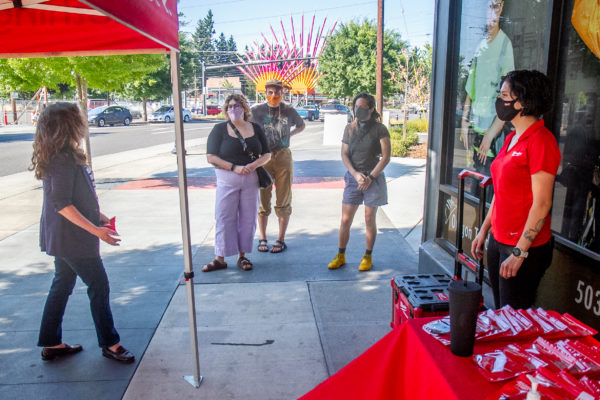
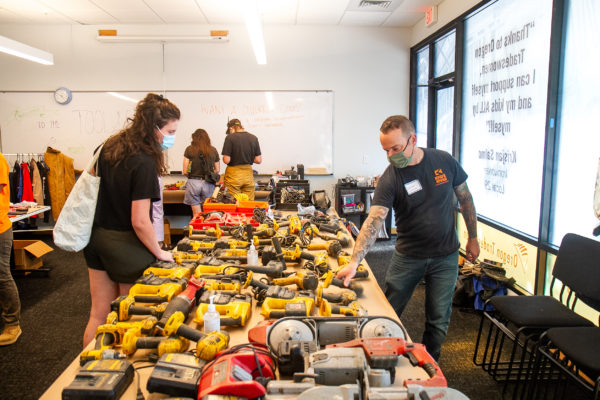
Now that the Tool and Gear Swap is over, we are filled with elation at the strength of our community and absolutely cannot wait to spend more time with you all! Your next opportunity to join the Oregon Tradeswomen community is every third Wednesday of the month at our virtual Social Hours and this October at Build With Us! Oregon Tradeswomen’s Blue Collar Gala! We hope to see you there!